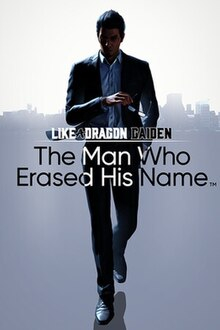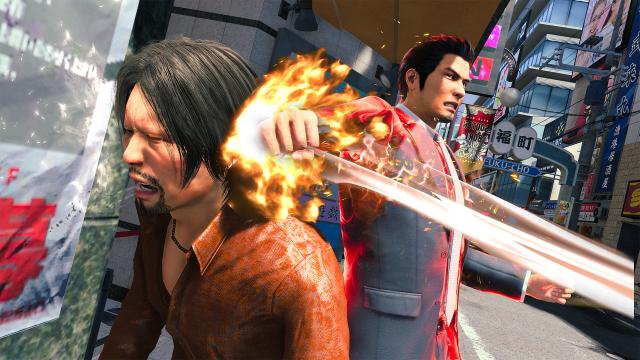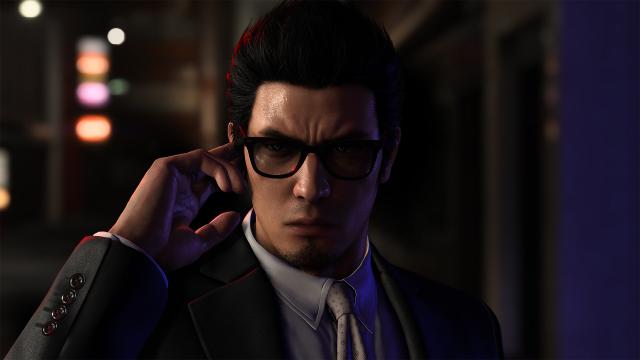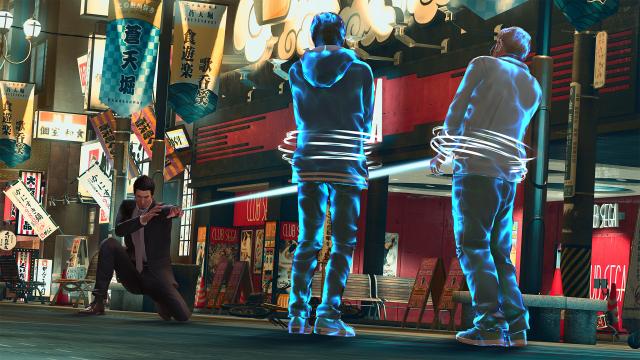Existing User Log In
New User Registration
Register for a free account to gain full access to the VGChartz Network and join our thriving community.





America - Front


America - Back

Sega
Action-Adventure
 (Add Date)
(Add Date) (Add Date)
(Add Date) (Add Date)
(Add Date)
| Owners: | 0 |
| Favorite: | 0 |
| Tracked: | 0 |
| Wishlist: | 0 |
| Now Playing: | 0 |
By Paul Broussard 23rd Nov 2023 | 5,996 views
You can’t keep a good jawbone smasher down, and the main protagonist of the Like a Dragon series, Kazuma Kiryu, is no different. Five years ago, Kiryu’s supposed swan song, Yakuza 6: The Song of Life, launched, depicting him stepping away from the street brawling life for good, to ensure the safety of the people he cared about. And then he showed up in Yakuza: Like a Dragon, to teach some important life lessons about not killing people. Then it was announced he’d be returning as a co-protagonist of the next mainline game, Like a Dragon: Infinite Wealth. Then it was revealed that not only would he be doing that, but he’d also be getting a lead role in his own side story set after Yakuza 6. Kiryu, buddy, your “retirement” decisions are starting to look a lot like Brett Favre’s, just with far less welfare fraud involved.

Like a Dragon: The Man Who Erased His Name (which is a hilariously inaccurate subtitle given how many people wind up recognizing Kiryu throughout the game) is set alongside the events of Yakuza: Like a Dragon, and tells the story of how Kiryu got sucked out of retirement and back into the street brawling life he can seemingly never escape from. While there's a semi-reasonable explanation for why Kiryu gets back on the streets, the story as a whole feels very lackluster and uncompelling compared to previous titles. There’s very little in the way of personal stakes involved in the conflict of The Man Who Erased His Retirement; we start off working odd jobs because we’re being blackmailed by the guys who helped us disappear in the first place, and then we spend a good two or so hours trying to rescue the guy who was blackmailing us after his life is put in danger, before the story shifts towards Kiryu getting mixed up in the Yakuza yet again, just in case we hadn’t gone back on the ending of Yakuza 6 enough yet. It all feels like a very flimsy justification for Kiryu returning, and frankly by the end of it I just felt like The Man Who Proclaimed His Virginity in a Mascot Costume wound up retroactively removing a lot of the finality from Yakuza 6’s conclusion.
Like a Dragon titles have survived without fantastic overarching narratives, however, just as long as the gameplay and characters remain entertaining. On that front, The Man Who Probably Shouldn’t Have Been Voiced by YongYea mostly succeeds. I’ll freely admit that, quibbles about the overarching narrative aside, I did enjoy hanging out with Kiryu again. He’s still an immensely entertaining character to get to spend time with, and the variety of side characters that he plays off of are pretty good too. The moment-to-moment writing also remains very entertaining, with one of the best sequences coming from engaging in a night of debauchery and lavash spending to annoy one of the main antagonists. There are also some surprisingly poignant moments at the end too, and if you can get over what it does to Yakuza 6, this title does do a lot to really drive home Kiryu as a person.

But the greatest strength of The Man Who Once Slapped a Nine Year Old is the combat, with Kiryu’s new kit taking a page out of what was designed for Takayuki Yagami in the Judgment games. Kiryu now has two fully-fledged styles that he can swap between on the fly: Agent style, a new fast, low damage style with access to different gadgets that assist in combat; and Yakuza style, which is basically his moveset from previous titles. As with the combat systems found in Judgment and Lost Judgment, there's a lot of fun to be had here. Switching styles can help extend combos beyond what would normally be possible in one style alone, and experimenting with the new tools at your disposal remains entertaining throughout.
Fighting in general has taken quite a bit of direction from Yagami’s games. The first time I grappled someone into the air, and then proceeded to swap between the Agent and Yakuza Stances to keep them airborne for a solid five or so seconds, I felt like I had slipped back in time to 2021’s Lost Judgment. Boss design has also taken some cues from the Judgment titles, with similar critical attacks that can be parried with a precise dodge once the boss reaches a certain health level. It’s all very nicely rounded and it makes combat with Kiryu much more enjoyable than it’s ever been in an official RGG Studios game.

Outside of combat, there’s the usual suite of side activities and mini games. Substories return, with a pretty good amount of variety and the inclusion of an overarching substory “manager.” In Chapter 2, Kiryu meets a character named Akame, who is a mixture of information broker and de facto supervisor for the homeless population. She runs a large information network in Sotenbori, where the majority of the game takes place, and Kiryu of course is tasked with expanding that network for… reasons. Honestly the narrative explanation still doesn’t make much sense to me, but the gist is that it’s important to do so because your advanced combat upgrades are tied to how much you’ve expanded the network, which makes it important to at least engage in to some extent.
Most of the substories involve some kind of request from Akame to do things, be it looking into rumors that eventually lead to fights, giving advice to random strangers that inevitably results in a fight, or just skipping the middle man and starting a fight. They’re well written and pretty entertaining, and centering them all around Akame and her network gives the whole thing a nice sense of progression, as you get to see the network expand and watch her develop as a character. It’s a good way to add some tangible story rewards and noticeable progression to side stories (as well as the usual financial benefits, of course).
Sadly the minigames in The Man Who Cried Over Losing at Pocket Racer aren’t up to the same level. Minigames in Like a Dragon titles have almost always been creative enough to carry even the less stellar entries in the series prior to now, but they fall rather flat on their face here. It’s just a variety of old showings this time around, from Mahjong, to card games, Pocket Racer, the arena, and yet another Cabaret Club (this version made especially creepy by the inclusion of live footage of real world actresses). Been there, done that before. The closest we get to a “new” minigame is a variation on the arena where we get to comprise a team of fellow hooligans and fight there, and while that's admittedly pretty entertaining, it’s pretty short and can’t really carry the lack of ingenuity in other areas. Even if an entirely new, large-scale minigame wasn’t feasible, it would've been nice to have seen one of the more complex minigames from previous titles (like the business or club management sims) repurposed here.

One last criticism is the familiarity of the setting, which, yes, is a mostly long-standing tradition within the Like a Dragon series. As previously mentioned, we're in Sotenbori for most of the game's runtime, and it starts to get pretty samey by the end. I know prior titles reused locations with impunity, and a budget entry like this probably only has so much room for new assets, but it's gotten to the point where we have at least three different settings to visit, between Sotenbori, Kamurocho, and Yokohoma. Heck, Chapter 1 mostly takes place in Yokohoma, before we promptly leave and never return. Would it really have been too much to ask for shifting between some environments to keep things fresh?
And that’s about it for The Man Who Smokes and Drinks Constantly Yet is Still Capable of Single-Handedly Winning Street Brawls in his 50s. I’m still not entirely convinced it needed to exist, but it provides enough fun and memorable moments to make it relatively easy to recommend for series fans. I will say that it’s a tougher recommend for people who don’t have a long-standing connection to the series, as many points in the story hinge on at least a general knowledge of events and characters from previous titles, but for long-time Yakuza fans, The Man Who Definitely Never Kills Anyone (That Helicopter in Zero Just Spontaneously Exploded) is a fun & mostly enjoyable 10-15 hour intermission until Infinite Wealth drops in January.
You will probably like The Man Who Erased His Name if: You've played previous Like a Dragon titles and the prospect of another romp through the streets with Kiryu sounds fun.
You might like The Man Who Erased His Name if: You've played previous Like a Dragon titles but had more attachment to the ending of Yakuza 6 than desire to see Kiryu return.
You probably won't like The Man Who Erased His Name if: You want games that maintain a consistent tone, or just don't have much connection to RGG titles.









